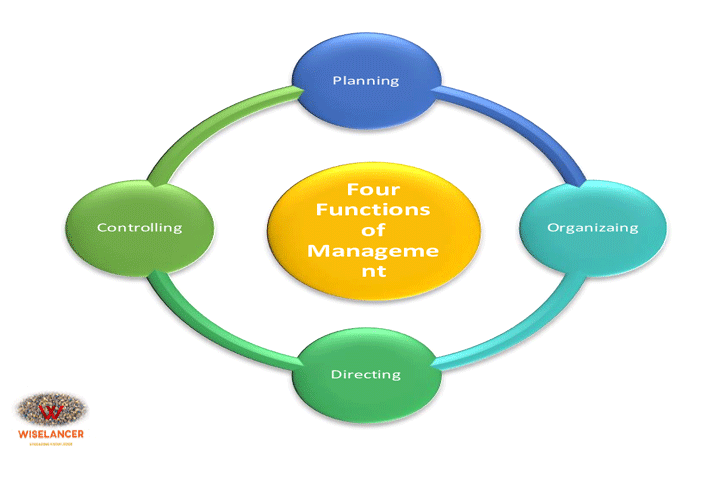What are the Four Functions of Management?
Planning | Organizing | Leading | Controlling
Words = 887
Characters = 5705
Sentences = 35
Paragraphs = 73
Reading Level = College Graduate
Reading Time = 3 mins 14 sec
Speaking Time = 4 mins 56 sec
What is Management?
It is the process of reaching organizational goals by working through people and other resources efficiently (Achieving organizational goals by wasting minimum resources or say performing the task in the best feasible manner) and effectively (Achieving organizational goals). Management is also classified into three levels in Organizations, so the roles and duties become easier and every process runs smoothly. Those three levels are as follow:

- Top Level Management
They hold titles such as Chief Executive Officer (CEO), Chief Financial Officer (CFO), and others like them. They make decisions that may affect the entire firm and direct organization.
- Middle-Level Management
They come after top-level management and include titles like General Manager, Plant Manager, and others. All are responsible for carrying out goals set by top management. They give the command to first-line management and perform day to day activities.
- First-line Management
They are also called supervisors and hold titles like the office manager, department manager, and others like them. They are responsible for daily management; these are the employees who produce products and services.
Four Management Functions
There are four basic management functions that are performed by each level manager in every organization. They have to be focused as they can lead to the accomplishment of goals in an effective and efficient manner. Following are the four functions of management:
- Planning
- Organizing
- Directing or Leading
- Controlling
Let’s elaborate on them to understand more clearly.
1- Planning
Planning involves choosing a task that must be performed to attain organizational goals. They define what to do, how to do, and when to do. It outlines how the task to be performed and indicate when they should be performed. It concerns the success of an organization that includes both short term planning as well as long term planning.
Importance of Planning
Following are the importance of planning:
- It helps in reducing uncertainty as through proper planning the chances of risk are low
- Once the goal and task are planned, they help in proper decision making as every aspect can be seen easily.
- It also helps in controlling
- Promotes new and creative ideas
- Reduces unnecessary activities and resources
Planning is the primary function of management and focuses on achieving the object.
Proper planning = Successful business
2- Organizing
Organizing is part of functions that is also important and organizing is to create a mechanism to put plans into actions. Organizing factor arranges on resources and activities to perform perfectly. Here, deciding to take place that will do what task and job, and who will work for whom. For addition the process involves
- classification of activities
- Classifying groups
- Distributing assignment and duties
- Assigning authority and formation of responsibility
Importance of Organizing
Following are the importance of organizing:
- It generates specialization as every role is distributed and keenly observed every activity.
- It provides for most advantageous utilization of resources
- Helps the organization to work effectively and efficiently
- It also helps in achieving coordination among all departments
- It also helps in the generation of new change
3- Directing/Leading
It also refers to motivating, influencing, and directing or leading. Directing or leading is nothing but this is guiding the people in an organization, so they will work with more dedication. It works as a guiding factor for the activities of the organization’s members in the proper direction. So, it helps the organization move towards the fulfillment of goals.
Importance of Directing/Leading
Following are the significance of directing and leading:
- It initiates the actions to obtain an ideal outcome in an organization
- It is important to keep all the fundamentals like supervision, motivating, communication, and leadership effectively and efficiently.
- Also, makes sure that every single employee is performing their duties in a perfect manner
- Through this, management can judge the weakness of employees
- On the bases of performance, appropriate changes can take place in an organization through effective direction
4- Controlling
It is the process that makes sure that all resources are effectively in use. The company is efficiently achieving the organizational goal. It also determines the next action plan and modification for meeting the desired results of goals.
Importance of controlling
Following are the importance of controlling
- You can measure the performance of the organization easily to achieve better
- You can compare the performance of each individual
- More actions can put after analyzing
- Control prediction and feedback that helps in building efficient
- All performance can be analyzed
Basic Skills to Meet Functions
The following basic skills needed to meet goals more easily.
-
Technical skills
They are the people who perform a specialized task related to their field with some special capabilities. (These are followed by low level)
-
Human skills
They are the most basic ability that makes them able to work with other people in both manners individually and a group. They know how to communicate, motivate, and lead. (Middle-level use this)
-
Conceptual Skills
They have the ability to think and abstract, diagnose, and analyze different situations. (Follow by top-level)
-
Decision Making Skills
The ability to make the quick and right decision at a time but make sure the decision should be wise. (Follow by top-level)
-
Time Management skills
The most important skills that everyone should have to follow are to manage time as this leads to the key to success.
Read More:
Does Handing Autonomy to your Employees Foster Creativity?
Trait Theory – Stogdill’s Trait Theory of Leadership
Path Goal Theory of Leadership

Comments are closed.